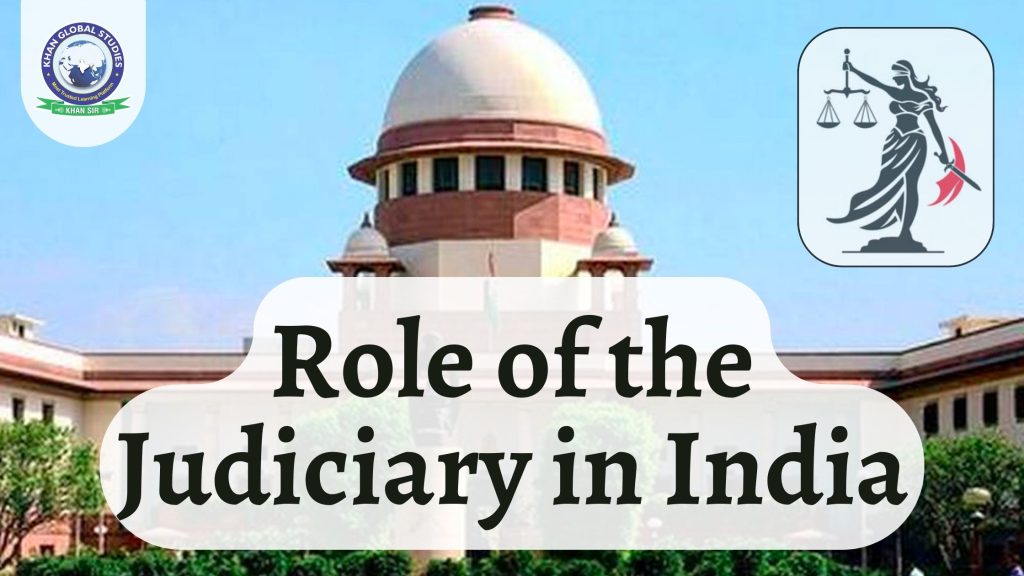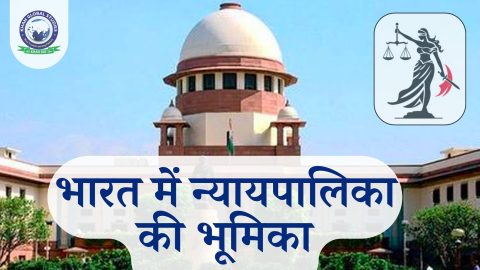The constitution is the supreme authority in a democracy, while the judiciary serves as its vigilant guardian. Democracy empowers citizens to be involved in decision-making, either through elected representatives or direct participation. The separation of powers divides governance into three branches: the legislature, which makes laws representing the will of the people; the executive, which enforces these laws under the leadership of individuals such as the president or prime minister; and the judiciary, which interprets and enforces these laws, ensuring that they conform to constitutional principles and protect individual rights. This division is important in preventing centralization of power.
In parliamentary systems such as India, the executive and legislature are intertwined. The judiciary plays a vital role in upholding the rule of law and acting as a shield against abuse of power, thereby maintaining a balanced democratic system.
The Role of an Independent Judiciary in Democracy
As the largest democracy globally, India recognizes that a healthy democracy cannot thrive without an independent judiciary. Acting as a safeguard against potential violations of the rule of law, an independent judiciary ensures that justice is administered impartially. As Dr. B.B. Chaudhuri eloquently stated, “Justice, being the soul of the state, must be administered without fear or favour.”
The Indian Constitution has various provisions to ensure an independent judiciary. These include the process of appointing judges, setting their salaries and allowances, prescribing the procedure for their removal, and even empowering the judiciary to punish violations of the law.
The importance of an independent judiciary is underscored for several reasons. First, the judiciary acts as the first line of defence against any encroachment or unauthorised exercise of power by the executive or legislative branches, thus providing a system of checks and balances. In addition, the judiciary examines any law that violates the Indian Constitution and, if necessary, repeals it by declaring it void, thereby eliminating any centralisation of power. An impartial judicial system is essential to protect the rights of minorities and other marginalized groups in a multicultural and diverse nation like India. Also, a strong and independent judiciary is vital to uphold the rule of law, which ensures that all people are governed by the same laws regardless of their status or influence.
Judicial Review
The judiciary has the power to examine any law or executive action that it believes violates the provisions of the Constitution. This power is exercised through judicial review, which allows the judiciary to declare a law or executive action unconstitutional. Judicial review has been instrumental in shaping the Indian Constitution and ensuring its effective implementation. The concept of judicial review in India was adopted from the Constitution of the United States.
The scope of judicial review in India is wide, addressing a wide range of issues. Most importantly, the Supreme Court acts as the guardian of fundamental rights and protects the rights of Indian citizens by issuing various writs provided under Article 32.
Landmark Cases in Judicial History
Several landmark cases have shaped the Indian legal landscape and the judiciary’s role in protecting constitutional principles:
- Kesavananda Bharati v State of Kerala (1973): This case was a turning point in Indian constitutional history when the Supreme Court established the “doctrine of basic structure”. The Court ruled that Parliament has the power to amend the Constitution but cannot change its basic structure, thereby outlining the fundamental principles that form the cornerstone of Indian constitutionalism.
- Indira Gandhi v Raj Narain (1975): In this case, the Supreme Court delivered a landmark judgment declaring the declaration of Emergency in India illegal
- Maneka Gandhi v. Union of India (1978): This case expanded the interpretation of personal liberty, emphasising that any law depriving a person of life or personal liberty must be just, fair, and reasonable. It developed the concept of “procedure established by law” under Article 21, ensuring that any legal process must be just and equitable.
- Vishakha v. State of Rajasthan (1997): This landmark case addressed sexual harassment at the workplace and led to the creation of guidelines known as the Vishaka Guidelines to prevent and address such issues. This judgment filled a legal lacuna and paved the way for legislation to deal with workplace harassment.
- Union of India v. Navtej Singh Johar (2018): By striking down Section 377 of the Indian Penal Code, which criminalised homosexuality and classified homosexuality as a crime, the Supreme Court affirmed the rights of the LGBTQ+ community, marking a watershed moment in the recognition of their rights.
Judicial Activism and Public Interest Litigation
Judicial activism, which originated in the United States, empowers the judiciary to actively protect the rights of citizens by interpreting laws or the Constitution in ways that address contemporary social needs. It serves as a bridge when legislative efforts fail, thereby ensuring the protection of fundamental rights. Judicial activism moulds legal principles to suit social needs and acts as a check on executive authority, preventing usurpations. It protects democracy, minorities, and marginalized groups while promoting equality, social justice, and good governance.
Public interest litigations (PIL) in India empower citizens to address issues affecting the public at large. The judiciary has actively used PIL to advance causes such as environmental protection, sustainable development, and wildlife conservation. PIL has also been instrumental in upholding individual liberties, including the right to privacy, freedom of expression, and the fight against discrimination. Landmark decisions in PIL cases have paved the way for significant social change, advancing education, women’s rights, and decriminalizing homosexuality.
Challenges for the Judiciary
Despite its important role, the judiciary faces several challenges:
- Judicial Activism versus Separation of Powers: Critics argue that judicial activism can undermine the separation of powers, leading to judicial overreach, where the court interferes with the actions of the legislative and executive branches.
- Pending Cases: The Indian judicial system is struggling with a significant backlog of cases, leading to justice delays and eroding public confidence. Although some reforms have been implemented, more sweeping changes are necessary to address this issue.
- Access to Justice: Many Indians, especially disadvantaged groups, struggle to access legal services due to factors such as limited legal knowledge, financial barriers, and inadequate infrastructure. Addressing this requires increasing legal literacy, providing affordable legal aid, and making the legal system more user-friendly.
Conclusion
In conclusion, the judiciary is the cornerstone of Indian democracy, playing a role far beyond interpreting the law. It is the foundation of justice, protects individual liberties, enforces accountability and upholds the rule of law. However, challenges remain, including the need for greater access and addressing pending cases. As India evolves into a dynamic democracy, it is essential to refine the judicial system, promote transparency and strengthen mechanisms that provide justice for all. Through such efforts, the judiciary will continue to flourish as a guardian of democracy, leading India to a future of justice, equality and preservation of democratic ideals.





